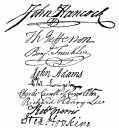American Independence Day
Part 1: The Need for Independence July 4 in America is Independence Day. This holiday celebrates the signing of the Declaration of Independence, which declared the 13 American colonies independent from Great Britain. This occurred on July 4, 1776.
But once the Americans declared themselves independent, the British victories began to pile up. (More in Part 2.) How had it come to this? Just 13 years before, the Americans had fought alongside the British in what Americans call the French and Indian War. This was a great victory for England, which gained Canada from France as a result. But that war was costly both in American lives and British taxes. The British government had a large debt after the war and wanted to pay it off quickly. George Grenville, who was head of the British Treasury and later Prime Minister, came up with what he must have thought was the brilliant idea of taxing the American colonies to pay for the war just concluded. Grenville wanted to keep his popularity at home; so when his country needed money, he ordered that taxes be collected from across the Atlantic. The British people surely thanked him. The American people assuredly did not. Out of Grenville's imaginative brain came the Sugar Act and the Stamp Act. The latter especially angered the Americans, since they used a lot of paper, on things like bills and newspapers.
The tax that seemed to anger the Boston colonists the most was the Tea Tax, which especially angered Bostonians because they did a large tea business. Incensed Sons of Liberty had had enough, and they dumped a whole boatload of tea into Boston Harbor. (This was the Boston Tea Party.) Britain responded by closing Boston Harbor, among other things. Then came Lexington and Concord.
The movement that had begun with a few small demonstrations now became a large movement backed by armed men willing to die fighting for the cause of freedom. Once the Independence idea caught fire, the flame was never extinguished. The result was the Declaration of Independence, a document that produced a new nation. Next page > The Reality of Independence > Page 1, 2, 3 |
|
Social Studies for Kids
copyright 2002–2024
David White



 America
at that time was in the middle of a war, although it wasn't
widespread yet. The British and the Americans had traded
shots at Lexington and Concord and fought a fierce battle at
Bunker Hill. Skirmishes had also taken place elsewhere in
New England, as well as in North Carolina and other places
up and down the Atlantic Seaboard.
America
at that time was in the middle of a war, although it wasn't
widespread yet. The British and the Americans had traded
shots at Lexington and Concord and fought a fierce battle at
Bunker Hill. Skirmishes had also taken place elsewhere in
New England, as well as in North Carolina and other places
up and down the Atlantic Seaboard.
 Then
there was the matter of British soldiers' firing on a
supposedly unarmed crowd, as in the
Then
there was the matter of British soldiers' firing on a
supposedly unarmed crowd, as in the  The
American colonists felt increasingly like they wanted to
govern themselves. They were hundreds of miles away from
Great Britain. They resented the royal governors that
patrolled the
The
American colonists felt increasingly like they wanted to
govern themselves. They were hundreds of miles away from
Great Britain. They resented the royal governors that
patrolled the 
